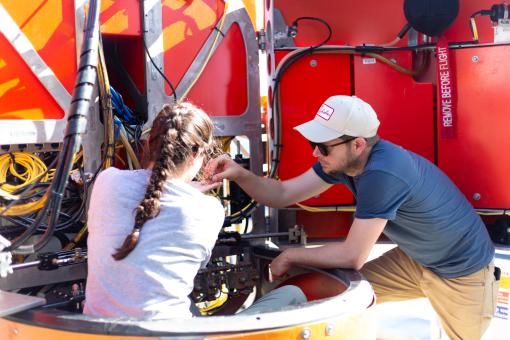While the ocean is still mostly unexplored, we definitely know some basics— the deep sea is deep, dark, and extremely high-pressured! When it comes to exploring and learning about this environment, we need specially-designed tools. Luckily, as technology specialists, we’re up to the challenge!
“Exploring the unknown is always exciting, but I particularly enjoy the challenge of ocean exploration. The ocean is a harsh environment that will crush instruments, corrode fasteners and short electronics if given the chance. Trying to take measurements of the very environment that wants to destroy your equipment is a fun (albeit frustrating) game."
-- Eric Hayden, AUV Specialist and Mechanical Engineer with Woods Hole Oceanographic Institution.
To design, engineer, and develop technology, we must use our imaginations and educational backgrounds. We design specific tools to help address a challenge scientists have in understanding our global ocean. These tools can be added onto ROVs or function on their own to collect data from the deep sea, the ocean surface, or anywhere in between. Creating tools for ocean science parallels aeronautics and space exploration so we also exchange technology and design ideas in those industries.
“The most fascinating part to me is all the moving pieces that go into the equipment and technology we use to explore the sea. I find it so rewarding to learn about all of the little parts that, when put together just right, allow us to visit and understand the underwater world."
-- says Jenna Ehnot, DriX Team Member, University of New Hampshire
Because E/V Nautilus serves as an expedition platform for technology testing, we get the opportunity to be part of the experimentation and development cycle of new tools. Some examples of technologies deployed from the ship include DriX, Mesobot, DAP Lander, Sentry, Norbit Sonar, NASA’s Underwater Gripper, ROV squishy fingers, Laser Divebot, and more.

Career Pathways
Technology specialists have varied backgrounds including engineering, computer science, robotics, and manufacturing. Unique skills like 3D printing, electrical engineering, coding, and even architectural design are essential for creating successful marine technology. Many of us as kids liked to invent new machines or build with Legos.
Some tech specialists have degrees and certifications in many fields including ocean engineering, mechanical engineering, electrical engineering, electronics technician certification, biology, and computer sciences. Other careers with similar skill sets include systems engineering, electrical engineering, mechanical engineering, petroleum engineering, electrician, machinist, ocean engineer, computer-aided design (CAD) drafter, architect, and more.






